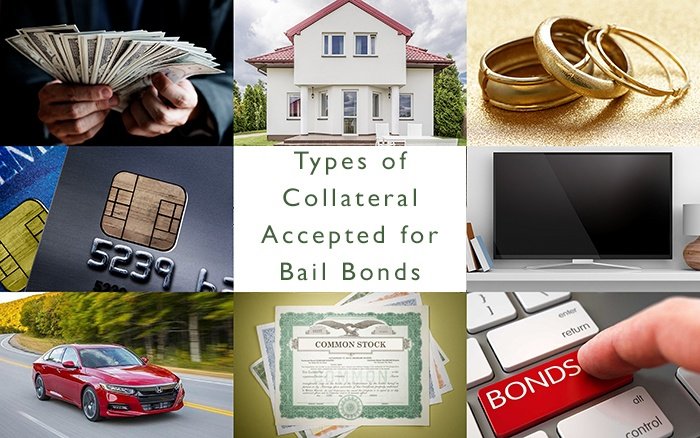Different Types of Collateral Accepted for Bail Bonds
When most people think about posting bail for someone they worry they won’t have enough money to either cover the bail themselves or satisfy the requirements of the Adams County bail bond agent. But bailing someone out of jail does not always require you putting up large amounts of cash. There are a number of different things either the state or the Adams County bondsman will accept as collateral in lieu of or in addition to cash. Below we’ll look at the different types of collateral accepted for bail bonds.

The Importance of Collateral to the Adams County Bail Bonds Agent
Every time an Adams County bail bonds agent puts up money to cover someone’s bail they are taking a risk. If the person flees after being released bail is revoked and the bondsman loses all the money they put up. If there were not protections built into the system bondsman would go broke in short order. Hence, collateral. Collateral is the bondsman’s insurance policy guaranteeing that if the accused flees once released on bond the bondsman is not forced to take the financial hit.
Bond Collateral: How it Works
Bond collateral is an insurance policy that enables the Adams County bail bonds agent to provide their services without fear of being hung out to dry. If the accused fails to appear on their appointed court date and bail is revoked the collateral will be seized by the bondsman or the state (if you arranged bail yourself without using a bondsman). Conversely, if the accused lives up to all the responsibilities of their release then the collateral is returned to the indemnitor once the case is concluded.
Type of Bail Bond Collateral
- Property - Probably the most desirable and useful type of collateral because the value of a home typically far exceeds any bail amount. As long as that is so and there are no outstanding liens on the home this type of collateral is accepted by both state and any bail bonds agent. Putting your home up as collateral however is not without risk because if the person you bail out flees and their bail is revoked you may lose your house.
- Car or other vehicle - Most Adams county bail bonds agents will require some form of collateral and cars are a popular choice. Before putting your car, pickup or other vehicle up as collateral you’ll need to determine exactly what its market value is. If you discover it has sufficient value to use as collateral you’ll need to sign ownership over to the Adams County bail bonds agent who will return ownership to you if the bailed individual meets all the requirements of their release.
- Stocks and bonds - Using stocks or other guaranteed investments as collateral is perfectly acceptable should you have enough to cover the cost of the bond. Again, however, be careful when using your long-term investments as collateral because if the person skips bail once released you will lose them.
- Credit cards - If the limit on your credit card exceeds the amount of bail then using a credit card as collateral is a perfectly acceptable thing to do. Using credit cards as collateral makes the process very simple and doesn’t endanger long-term investments like your home or stocks. Sure your credit may be tight for a while but if your loved one fails to appear in court you’ll still have a house to come home to.
- Jewelry - Jewelry can be somewhat problematic simply because fake jewelry can often be quite convincing even though it may be worth virtually nothing. In order to be able to use jewelry as collateral an Adams County bail bonds agent will likely require that you have the jewelry professionally appraised first. Should the appraisal yield a value that is in excess of the bail requirements they will likely accept the jewelry as collateral.
- Electronics - While this is a less popular type of collateral some bail bond agents in Adams County will accept electronics as collateral if they are of sufficient value. With smartphones regularly valued at more than $1,000 and large HDTVs valued at several times that amount Adams County bondsman are no longer as reluctant as they once were about accepting electronic devices as collateral for a bail bond.
- Cash - Cash is not a common form of collateral simply because if a person has enough cash to cover the bail amount they will often just pay it themselves without going to an Adams County bail bonds agent. However, there are those who don’t want to the powers that be to scrutinize their finances and this can sometimes happen if a person puts up a large cash bail themselves. In such cases the government may ask where the person got all this cash from. Even if it was legally obtained through years of hard work the state may take it upon themselves to turn the person’s finances inside out looking for potential impropriety. As such, some people find it preferable to simply enlist the services of the Adams County bondsman and use their cash as collateral
Most every Adams County bondsman will require collateral for any sizeable bail situation in order to protect themselves should the accused flee once released. The good news is that, as you can see, there are many types of collateral you can use to help secure the release of your loved one. So even if you are not cash rich you may still be able to secure a bail bond if you have one or more of the above assets.
Different Types of Collateral Accepted for Bail Bonds
The first thing most people do when they have been arrested and charged with a crime is to contact a lawyer to discuss the matter and get the wheels of their own defense turning. The second thing they do is try and arrange for bail. Most will call their wife or husband while many others, especially younger offenders, call their parents. Should family members not be available some people call their friends or anyone else they have a personal relationship with to contact a bail bonds agent.

The Indemnitor
Whoever positively responds to the request for aid will likely contact a bail agent and agree to be the “indemnitor” for the accused. That is, they agree to put up collateral to secure the assistance of the bondsman and sign a contract that makes them responsible for the person being bailed out. But is it always necessary to have an indemnitor? And if you contact someone for help do they always need to put up collateral?
Last Things First: The Collateral Issue
While your typical Adams County, Broomfield County, Weld County or Denver bail bonds agent is a fine upstanding citizen they are not in the charity business. Bail bonding is in fact an extremely risky proposition wherein a bondsman is asked to take a chance that someone he’s never met won’t jump bail after being released and leave him holding the bag. Perhaps in a perfect world where everyone’s intentions were pure as the driven snow this kind of trust would be possible. However, in this world snow festers in the gutters mixing with garbage and dirt. So, asking the bail agent to simply trust you is like asking a bank for a no interest loan. Not gonna happen.
Protecting the Bail Bonding Agent
As such bail agents insist that whoever comes to them for help provides some sort of guarantee so that, should the offender hightail it out of Dodge and the bail be revoked, the bondsman has a way to get his money back. That only makes sense. So the indemnitor typically puts up something of sufficient value - such as a house or expensive car or even stocks and bonds - as collateral and if their loved one runs the bondsman comes knocking with a court order allowing him to seize that collateral. It’s a good system that protects the bonding agent so they can go about their important work in a timely and secure fashion.
The No-Collateral Option
But what if the loved one or other person doesn’t want to put their house on the line to cover someone else’s butt? Do they have any options? Of course. They can pay cash, in which case the collateral issue is taken off the table and there’s no need to enlist the services of a bail bonds agent. (Keep in mind that even if they pay in cash they still become the indemnitor of the accused, accepting responsibility for the person they’re bailing out.) “So why doesn’t everyone just put up cash?” you ask. For a few good reasons actually.
- First, very few people have enough cash lying around to bail someone out. Especially if the charge is serious and the bail is a 5 or 6 digit amount. When someone uses a bail bonding agent they only need to put up 10% and the agent puts up the rest, with his share protected by the collateral.
- Second, if the accused runs after being released on bail the person that put up all that cash to have them released loses it all. Every penny.
- Third, even if the defendant doesn’t run that cash is going to be held by the state until the legal process related to the charge is finished at which time it will be returned. But that could take months and, in some cases, years. During that time the person who put up the money won’t be able to touch it.
So as you can see, while cash might seem like a simple option it’s also an option with several significant downsides.
Is it Always Necessary to Have an Indemnitor?
While they won’t come out and say it most states prefer that a person have an indemnitor. That’s because the odds of a defendant fleeing while out on bond are significantly less if they know that by fleeing the person who helped them will suffer. The odds that they will run are even more remote if the indemnitor is someone they have long-standing emotional ties to, like a parent or sibling. If they handle everything themselves they may consider fleeing a victimless crime and head for the hills.
But back to the question. No, it is not legally necessary for the accused to use a bail bonds agent or to have an indemnitor. They can choose to post bond themselves if they have sufficient resources or they can simply choose to stay in jail while awaiting trial. Alternatively, they can always hope to convince the judge to release them on their own recognizance; a strategy that is not likely to work if any sort of serious charges are being leveled.
The Bottom Line
Regardless of whether a person has been arrested in Adams County, Broomfield County, Weld County or Denver proper they will need to know their options when it comes to making bail or posting a bond. Call RR Bail Bonds at (720) 988-8304 to find out more.